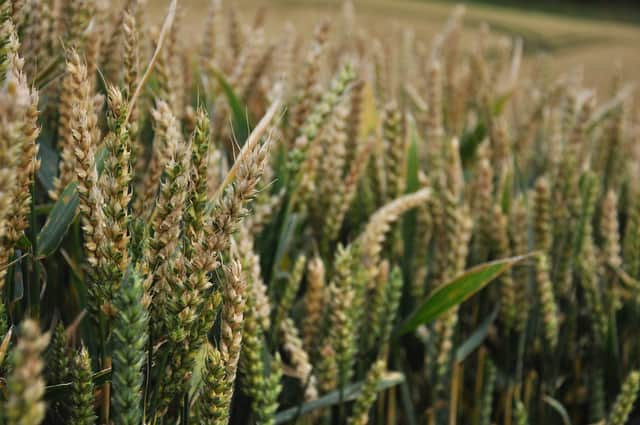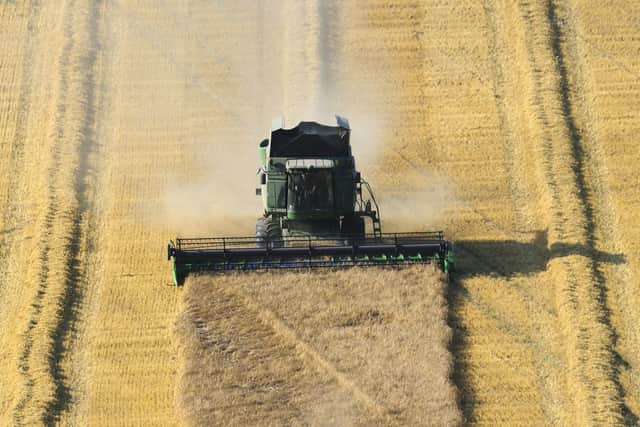Gene edited crops: government’s new gene editing rules explained - and how did the food industry respond?


Gene edited food and drink has moved a step closer to appearing on supermarket shelves as the government revealed plans to relax regulations around the practice.
Under the newly announced rule changes, it will now be easier for scientists to undertake research and development projects into gene editing.
Advertisement
Hide AdAdvertisement
Hide AdFor centuries, traditional methods of selective breeding have been used to create stronger, healthier crops.
But the government believes gene editing could create crops that are more nutritious and resistant to pests and diseases, reducing the need for chemical pesticides, and boosting yields.
Environment Secretary George Eustice said the move would help better protect the environment whilst also bolstering the UK’s food security.
However the news has been met with concern by some in the farming community.


What is the difference between ‘gene edited’ and ‘genetically modified’?
Advertisement
Hide AdAdvertisement
Hide AdThe Department for Environment, Food and Rural Affairs (DEFRA) said its next course of action would be to review regulations so that gene edited plants could be defined as being different from genetically modified ones.
Under the current rules there is no legal distinction between the two terms.
But according to the government, gene editing differs from genetic modification because it “does not result in the introduction of DNA from other species”.
Instead, the process creates new varieties of plant which are similar to those that could be produced by natural breeding methods, albeit much more slowly.
Advertisement
Hide AdAdvertisement
Hide AdAs well as altering gene editing’s legal definition, DEFRA said it would also be considering how genetically edited products could be brought to market “safely and responsibly”.
These next steps would only apply to England as the devolved nations control their own food and environmental legislation.
“Gene editing has the ability to harness the genetic resources that nature has provided. It is a tool that could help us to tackle some of the biggest challenges that we face – around food security, climate change and biodiversity loss,” said Mr Eustice.
“Outside the EU, we are able to foster innovation to help grow plants that are stronger and more resilient to climate change. We will be working closely with farming and environmental groups to ensure that the right rules are in place.”
What does the food and drink industry think?
Advertisement
Hide AdAdvertisement
Hide AdDEFRA’s original consultation on its proposal, which took place between January and March 2021, was backed by the National Farmers Union (NFU).
In its response, the NFU said gene editing offered “huge opportunities” for farmers as it could help them battle pests and diseases and overcome climate challenges while also allowing “more efficient use of resources” - something it said would help the farming industry achieve its net zero by 2040 target.
One group of growers which believes it particularly stands to benefit from gene editing is the apple industry.
Orchards have been buffeted by bad weather in 2021, with late frosts and cold temperatures in April and May damaging varieties like Cox, and heavy rainfall and hail throughout the summer months further damaging the fruits.
Advertisement
Hide AdAdvertisement
Hide AdExecutive chair of trade body British Apples and Pears Ali Capper told NationalWorld the gene editing announcement was “great news” because it could mean apples retain their taste, colour and appeal - key drivers for shoppers - whatever the weather.
One climate-related disease Capper pointed to was canker, which kills apple trees and reduces fruit quality.
“If we can identify the gene for it, we can remove the problem. What’s exciting about gene editing is you’re not introducing something into a plant, you’re taking something out. It speeds up breeding so you don’t have to go through years of assessment [of genetics],” Capper explained.
But not everyone believes gene editing is a positive step.
The Soil Association, which certifies organic food and drink producers, argued the proposals would not tackle the long-term causes of the problems facing food and drink suppliers, for example a lack of crop diversity and the decline in insect populations.
Advertisement
Hide AdAdvertisement
Hide AdIt also called into question whether deregulation would ultimately be in the best interests of farmers.
Joanna Lewis, Soil Association director of policy and strategy, said: “Gene edited organisms can be heavily patented and play heavily towards corporate interests.
“What is to stop profit-driven interests overpowering the hopes the government has for the technology?
“How do we prevent crops being designed to sell more pesticides, not less?”
First major policy change since Brexit
Advertisement
Hide AdAdvertisement
Hide AdShould the UK legalise gene editing, it would mark the first major divergence from EU food rules since Brexit. EU laws governing food and drink are among the most stringent in the world and so this move could lead to friction between the UK and EU.
However, attitudes in Brussels towards gene editing appear to be changing. In April 2021, the European Commission launched a review into the laws governing gene editing, which paved the way for a move that could be similar to the UK’s.
Countries such as Brazil, Canada and the USA already allow for gene edited crops to be grown.
Comment Guidelines
National World encourages reader discussion on our stories. User feedback, insights and back-and-forth exchanges add a rich layer of context to reporting. Please review our Community Guidelines before commenting.
